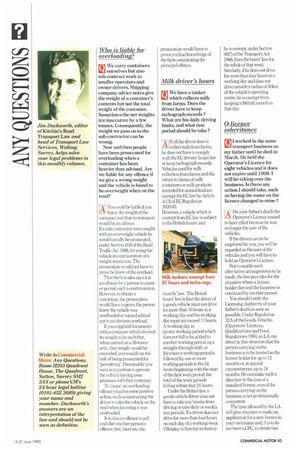We have a tanker
Page 45

If you've noticed an error in this article please click here to report it so we can fix it.
which collects milk from farms. Does the driver have to keep tachograph records ? What are his daily driving limits, and what rest period should he take ?
AIf all the driver does is collect milk from farms, he does not have to amply with the EC drivers' hours law or keep tachograph record& Vehicles used for milk collection from farms and the return to farms of milk containers or milk products intended for animal feed are exempt the EC law by Article 4(13) of EC Regulation 3820/85.
However, a vehicle which is exempt how EC law is subject to the British hours' and records' law The British hours' law is that the driver of a goods vehicle must not drive for more than 10 hours in a working day and his working day must not exceed 11 hours. A working day is: (a) any working period which does not fall to be added to another working period, eg a straight-through shift, or (b) where a working period is followed by one or more working periods in the 24 hours beginning with the start of the first work period, the total of the work periods falling within that 24 hours.
Under the British law, a goods vehicle driver does not have to take any breaks from driving or take daily or weekly rest periods. If a driver does not drive for more than four hours on each day of a working week (Monday to Sunday inclusive) he is exempt, under Section 96(7) of the Transport Act 1968, from the hours' law for the whole of that week. Similarly, if he does not drive for more than four hours in a working day and does not drive outside a radius of 50Icm of the vehicle's operating centre, he is exempt from keeping a British record on that day.
























































































































